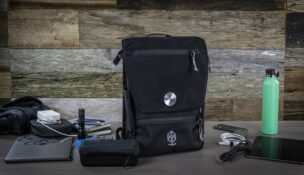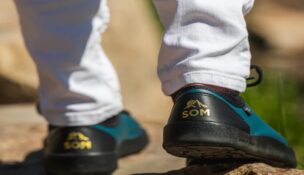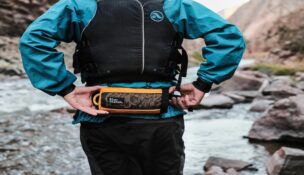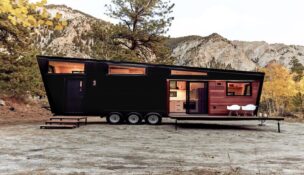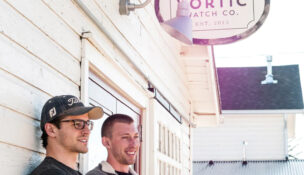2019 Colorado Startups on the Rise
Five enterprises acting on big ideas
Gigi Sukin //March 5, 2019//


2019 Colorado Startups on the Rise
Five enterprises acting on big ideas
Gigi Sukin //March 5, 2019//

Innovators across the state are coming up with inspired solutions to meet market challenges and demands – including some we never knew existed. These startups are more than hype; they’re real businesses making real impacts and generating real revenues.
Here’s a look at five Colorado companies and their early-stage paths:
Collective Retreats
www.collectiveretreats.com
Founded: 2015 HQ: Denver Funding: $12 million
Glamorous camping – better known as “glamping” – effectively crossbreeds outdoor adventure and luxury. In a 2018 study, travel company Cox & Kings named the travel trend one of the top eight experiences that will continue to grow in popularity.
Experiential travel company Collective Retreats offers such seasonal luxury accommodations under canvas in hard-to-access locations, including secluded portions of the Vail Valley; Big Sky, Montana; and more. The “asset-light” business doesn’t own the land it camps on, but it maintains a laser focus on guest experience, developing activities like fly-fishing, white-water rafting and horseback riding, along with lavish accommodations like spa access and concierge services.
Co-founder and COO Cristina DeVito shed some light on her startup’s lifecycle:
Inspiration
“Collective Retreats was founded in 2015 by Peter Mack and [me] with the goal of creating a truly unique experiential travel brand where modern adventurers could enjoy the great outdoors without compromising on luxury,” DeVito says. “Our dream was to open up a whole new world of exploration where five-star luxury coexists with an authentic ruggedness.”
Leadership
A veteran of the hotel industry, Mack created Collective Retreats’ unique business model after identifying that the majority of hotel consumer revenue is spent on property expenses and upkeep, and not toward enhancing the guest experience.
As for DeVito, “Before joining Collective Retreats, I was the vice president of operations at Manicube, an on-demand beauty startup acquired by Red Door Spa,” she says. “Before that, I began my career as an investment banking analyst with Wachovia Securities and later as a private equity investor.”
Experience
“Each retreat is designed to help guests experience the best of a destination, starting with unique accommodations that take inspiration from the surrounding landscape,” DeVito says. “For example, in our Montana location, our signature s’mores are infused with local huckleberry ingredients and enjoyed around the campfire.”
Funding
With $2.5 million in initial seed funding, Collective Retreats entered the travel space to shake up the concept of hotels. To date, the company has raised more than $12 million in funding.
Future
“Next season, we’ll be expanding our guest accommodation types with the introduction of Outlook Shelters,” DeVito says. “Overall, our goal is to see Collective Retreats grow from the five retreats we’re operating today to a robust portfolio of retreats across not only the U.S., but internationally.”
Silvernest
www.silvernest.com Founded: 2015 HQ: Denver Funding: $5 million
Stepping into the “longevity economy” nearly four years ago, Silvernest is challenging the conventions of aging, appealing to a 50-plus crowd with an intergenerational housing solution. The matchmaking marketplace, developed by Silvernest co-founders Wendi Burkhardt and Chuck McKenney, aims to pair empty-nesters with roommates and housemates for long-term shared living, helping senior citizens remain in their homes longer.
“The truth is, I lived my business,” Burkhardt says. “My dad died 4 ½ years ago and my mom was super independent, but she lived outside of Atlanta. So for her and my benefit, being based halfway across the country, she lived with a roommate after my dad died, largely because she missed the companionship.”
Calling the idea “obvious,” Burkhardt asks, “Why aren’t we helping fight isolation as we age? We’ve got a lot of empty bedrooms across the country.”
According to the U.S. Department of Health and Human Services, 72 million Americans are projected to fit in the 65-and-older age bracket by 2030. Last January, Burkhardt told The New York Times, “I really think the ‘Golden Girls’ were early trendsetters,” referring to the 1990s TV show about four over-50 women living under one roof.
After inking a formal deal in mid-2015, Burkhardt and McKenney developed proprietary software that’s “similar to a dating site,” Burkhardt explains, though marketing itself as a safer, smarter option than Craigslist. “It takes a lot of information to pair people for long-term living arrangements.” The app also includes a managed background check, lease-building tool, auto-rent and more.
Some renters further reduce their monthly rate by providing services such as transportation, housekeeping and yard work for their more mature housemates.
To date, the platform has qualified more than 40,000 matches, charging a one-time match fee to list a home. The company added another revenue stream in early 2018 with a $10 dashboard subscription, and for an extra $5 a month, clients receive legal counsel.
The Silvernest team had grown to 11 people by the end of 2018, raised roughly $5 million in investment, and had listings in all 50 states.
Rever
www.rever.co
Founded: 2015 HQ: Eagle Funding: $1 million
Justin Bradshaw came of age in the Vail Valley and spent his leisure time riding dirt bikes. In 2009 he built a company called Butler Motorcycle Maps that printed waterproof versions of the best motorcycle maps around the world. What started as a paper business morphed when Bradshaw began receiving requests from customers to convert his maps to a digital format. Six years after his first foray into entrepreneurship, he spun out another startup.
“For motorcycle drivers, the expectation is that of escape, to purposefully go off the beaten path,” Bradshaw says, adding, “It’s a lot more than just finding good motorcycle routes.”
Launched with technical co-founder Mark Roebke, Rever – pronounced “revv-er” – the free map app and website connected a global community of motorcycle riders, estimated at hundreds of millions. The core product features audio navigation and mileage tools, speed and elevation trackers. Users can browse rides, create custom routes, read comments, view images, trace and share experiences. A premium version costs $60 annually; revenue also comes from in-app advertisements and hardware sales.
With a team of six and counting, the 3-year-old cloud-based software startup closed on a round of $1 million in funding last summer, with investors including BMW. Rever, which Bradshaw says is “close” to being profitable, has garnered more than 1 million downloads and has users in more than 30 countries.
OverWatchID
www.overwatchid.com HQ: Denver Founded: 2016 Funding: $4.5 Million
OverWatchID secures identities and IT resources wherever deployed and strengthens IT security, all without significant negative impacts on IT workloads.
Inspiration
Founded to help customers protect their organizations from internal and external threats, OverwatchID saves those customers money on deployment, implementation and maintenance.
Leadership
OWID was co-founded in 2016 by high-tech and identity security veterans Andy Funk, who serves as CEO, and Cameron Williams, the CTO.
Funk brings 20 years of technology industry and managed services experience. An angel investor for technology corporations, he was part of the executive team and one of the original team members of Virtela Technology Services Inc., which was acquired in 2014 by NTT Communications for $525 million.
Williams has helped enterprise clients like IBM, Wells Fargo, Sony, BP and others keep their data safe from breaches, hacks, ransomware and spear-phishing for more than 25 years.
The Market
The identity security market is projected to top $35 billion by 2020. OverWatchID’s largest clients include Frontier Airlines, a Fortune 100 corporate travel provider and a Fortune 250 internet data services provider.
Funding
OverWatchID has raised nearly $4.5 million to date.
Future
A Series A round, slated to close the first quarter of 2019, will allow OverWatchID to add as many as 40 jobs (to its existing 50) in Colorado.
The Prepared
www.theprepared.com
HQ: Boulder Founded: 2017 Funding: NA
Q&A with founder John Ramey
CB: What does The Prepared do?
JR: The Prepared is a free website that helps people get ready for emergencies ranging from daily events like car accidents and job loss to big events like natural disasters and active shooters. Survival experts publish deeply researched guides (such as a beginner’s course on navigating without GPS) and product reviews.
CB: What was the inspiration behind the business, and what distinguishes your company from others in the market?
JR: We were frustrated by the endless stream of horrible and unhelpful (even dangerously wrong) content put together by government agencies or amateurs with no experience, combined with the massive amounts of extremism and ‘doomsday porn’ among the political tin-foil-hat crowd. That status quo meant millions of everyday people – people who wanted some basic answers to protect their family – were stuck on the sidelines because they had nowhere to turn. Or worse, they bought the wrong stuff on Amazon and didn’t realize it until it was too late.
The Prepared is different because we focus on common-sense prepping rather than advocating everyone quit society to move into a bunker in the woods. We use qualified experts who do real research and field testing so that you know you can trust our answer to ‘what’s the right emergency blanket to keep in my car for the winter?’ There’s also zero politics, propaganda or noisy clickbait.
CB: Can you give us some of your personal background?
JR: Tech entrepreneur and angel investor. Founded multiple successful companies, helped build market leaders like 3D hubs and mentored thousands of entrepreneurs worldwide.
I’ve been a prepper for 15 years and was one of the first ‘outed’ preppers in Silicon Valley. I’ve been teaching other people how to prepare in communities like San Francisco for 10 years.
CB: What are some of the company’s highlights and milestones?
JR: The massive positive response from the community has been a highlight from day one. We hear on a daily basis that The Prepared helped people by showing them how their thoughts and fears are normal, that their desire to become better prepared is normal, and that there are easy steps everyone can follow to better take care of themselves, their family and community.
It’s also great when we hear from people who’ve survived or better handled an emergency because of what they learned on The Prepared. For example, some residents caught off guard in the recent Northern California wildfires were able to evacuate in time and handled the following weeks with ease because of our work. One of the local fire departments even circulated our materials to educate people about how to communicate with ham radio when the cell network is down and how to best protect their lungs from the thick smoke.
CB: Present size of team; plans for growth?
JR: Our team is small, but we’ve tripled in the last month, adding great people like the co-founder of Ars Technica (now part of Conde Nast) and the previous editor-in-chief of one of the largest outdoor gear blogs.
CB: Can you share any revenue information? Are you profitable?
JR: We don’t disclose that information. We’ve generated revenue since day one, and our metrics are over 5x better than industry average.
CB: Can you describe the challenges/opportunities of building this business?
JR: Online content is in many ways getting worse, not better, because of the rise of extremism and decline of quality and well-researched publications. In other words, is it possible to build a financially sustainable online business based on rational content that took more than 20 minutes for an intern to produce? Or must everything be cat pictures and ADHD listicles that get a lot of social media shares but don’t actually improve peoples’ lives?
Fierce45
www.fierce45.com
HQ: Denver Founded: 2015 Funding: $0
Inspirational idioms such as “Shaking = Change,” and “BADASS” adorn the interior walls of five metro-area studios packed with rows of resistance bands, springs, movable bases and sweaty bodies bending and stretching atop them.
When Fierce45 burst onto the boutique fitness scene, the high-intensity program quickly grew a loyal following, so much that eager athletes must plan days, if not weeks, in advance to drop in to a class.
Fierce45 is the brainchild of Torrey Newman, a former sales and advertising executive who dove full-time into fitness in 2014 after experiencing a fast-paced Pilates class in Dallas. When Newman returned home, she realized the dearth of such options in Denver.
“That was when the light went off in my brain,” recalls Newman, who opened her first studio in the Lower Highland neighborhood in 2015. Studio No. 6 will open in early 2019 in Cherry Hills, and a North Boulder location is on its way.
She allows that the boutique fitness market is “competitive” – others call it saturated – but she says, “There’s always room, in my opinion. People want to find the one thing that resonates and feels good in their bodies.”
As a female business owner, Newman says her greatest hurdles have been “consistency and people.” She currently employs 13 full-timers and 85 contractors. “The team closest to you really has to understand your ‘why.’ They’re the ones you’re entrusting to communicate that, to filter it out to every other person who’s hired and every customer who steps through your door.”
To date, Fierce45 is self-funding its expansion. “We are on track to exceed $2 million in revenue this year,” Newman says. “And we’re profitable.”
Newman speaks of the success that other Colorado-based fitness brands – from Pure Barre to CorePower Yoga — have experienced.
“I aspire to follow in the tracks of Trevor Tice – the founder of CorePower. I would love to be a household name, to be a national brand. It’s not about me or my ego or the money. It’s about making an impact. You have the opportunity to make someone’s day.”
“I aspire to follow in the tracks of Trevor Tice – the founder of CorePower. I would love to be a household name, to be a national brand. It would mean a lot to me. It’s not about me or my ego or the money. It’s about making an impact. You have the opportunity to make someone’s day.”






